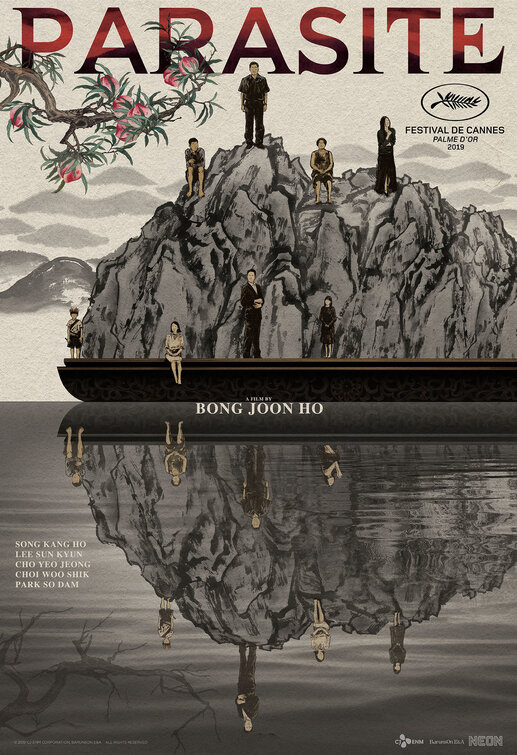Make Yourself At Home
Director
Bong Joon-ho
Starring
Song Kang-ho
Choi Woo-sik
Jo Yeo-Jeong
Park So-dam
Jang Hye-jin
Lee Sun-kyun
Lee Jeong-eun
Jung Ji-so
Jung Hyun-jun
From the film’s opening, we are introduced to the Kim family who are down on their luck and struggling to chisel out a living. Struggling to make ends meet, all four members of the family pitch in to get by. This all changes when Ki-woo’s [Choi] friend explains he is going abroad to study and wants the young man to pick up his tutoring job; partly to help the Kim family out and partly because he has feelings for his student and doesn’t see Ki-woo as a threat. Forging university documents, Ki-woo heads to the residence of the wealthy Park family, headed by the trusting, semi-neurotic Yeon-gyo [Cho] and is welcomed with open arms into the family home. Seeing an opportunity to gain employment for the remainder of his family, Ki-woo manufactures reasons to fire the current household staff and instead employee his family members, all posing as conveniently timed recommendations. But what starts out as a rather light and silly comedy of deception beautifully shifts to a bitter, simmering tale of acrimony and scorn; to put it bluntly, Parasite is a perfect movie.
**spoilers throughout**
Before starting, I should highlight that this review is not for anyone who has yet to see the film – this is a place for analysis and unfettered praise. Like a broken record, I have been saying for nearly two decades that South Korea has been producing some of the world’s greatest and underappreciated cinema. From the subject matter of the stories, to the technical execution, the innovative direction and the blisteringly good performances, South Korea is an absolute powerhouse modern movie maker. And Bong Joon-ho is a prime example of one of their finest assets. Just a simple oral description of the camera placement or the circumstances the characters find themselves in can in no way do justice to the sheer level of complexity and nuance injected into every single frame. This may sound extremely hyperbolic but as with something like Roma, there has to be some trick to explain how something so simple can be so utterly captivating and mercilessly emotional.
On the surface it’s very hard to point to a still image and detail what makes it so special. One could argue the cinematography is safe and functional, the camera movements are clean and simple and the set design is practical – but in actuality what Bong and cinematographer Hong Kyung-pyo have orchestrated is the most subtle performance of the entire piece, burning from start to end with markers, foreshadowing and reward. More than that, the film does so much with silence and subdued spatial work that really sets the bustling world of the city and the almost suffocating world of the luxurious house apart. And the final layer that elevates the whole thing is a decaying score by Jeong Jae-il that compliments everything spectacularly with its light, gentle piano opening giving way to the deep bass and frantic string elements we usually associate with horror films.
The acting on display is genuinely stunning – in every sense of the word – with so much being conveyed so sophisticatedly that to replace any element or to imitate it via a remake would lose so much in the process. As a character study, the film is also a phenomenal look into the preservation of family, populated by unscrupulous individuals on both sides, to the degree that it becomes very hard to identify and sympathise with anyone, as well as the rising uncomfortable feeling of relatability. With its seething resentment between the haves and have-nots and the frankly monstrous twists in the third act, one could quite easily argue that part of the reason this story is so good is because it feels intrinsically timeless. If I were to describe this movie’s plot and the general themes of disdain between a wealthy and impoverished family, neither of whom escape the movie without tragedy and then said it was set in pre-revolutionary France or post war America or even feudal China, it would be completely plausible.
As stated at the start of the review, I genuinely cannot fault this movie, the only reservation I would have is that I cannot recommend it to every type of cinemagoer and there are those who will feel it is slow or a little dull in places but I think that would be extraordinarily harsh and unwarranted for what is blatantly a masterpiece.
Release Date:
7th February 2020
The Scene To Look Out For:
Once the twist (if one could call it that, it’s more an escalation) has revealed itself, learning what happened to Da-song on his birthday is so subtly hilarious and tragic. Taking place at the bridge between the whimsical opening and the sobering finale, it retains elements of both and feels as playful as it is unfortunate.
Notable Characters:
The chemistry between the actors who play the Kims is second-to-none. From the opening scene, their bond and singular drive is astonishing. Everything that comes at them is dealt with as a unit and speaks to the motivation and cohesion born of their desperation. More importantly, each of the four performances feel magnificently real and lived-in. A prime example of this would be during the lightning storm. The Parks go on a camping trip for their son’s birthday and the Kims decide to stay in the house for the duration, drunkenly fantasising about what it would be like to live there permanently. The whole interaction is glorious and there isn’t a single weak component. Not to mention the scene then leads to a flipped performance and a rather terrifying additional one.
Highlighted Quote:
“You know what kind of plan never fails? No plan at all”
In A Few Words:
“An intensely superb cinematic achievement”
Total Score: 5/5
![The Red Right Hand Movie Reviews [Matthew Stogdon]](https://reviews.theredrighthand.co.uk/wp-content/uploads/2021/12/cropped-header1.png)




